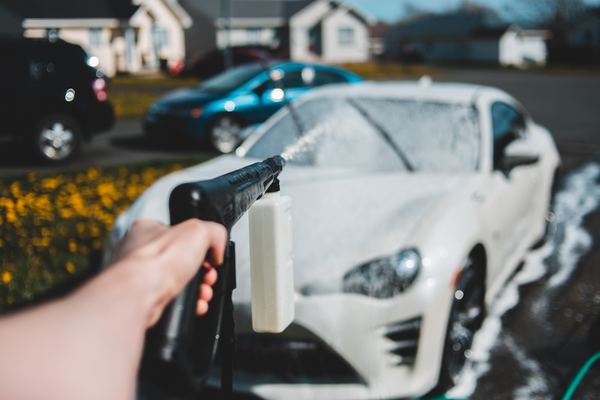6 Ways to Increase Your Car’s Resale Value

Guest Post By Lawrence Dorman
Similar to the way that maintaining your home or lawn can improve your property's market value, maintaining your vehicle can increase its resale value once you choose to sell. Like any asset, your car's value depreciates over time. But that doesn't mean your used car has to sell for the same price as a tired clunker.
Here are six ways that you can increase your used car's valuation, including the importance of an extended car warranty for reassuring potential buyers.
1. Consider your new car carefully before purchasing
Yes, you should be thinking about resale value even before you purchase a new car. This factor is often overlooked because buyers are concerned about style, price, safety, fuel efficiency, and other features. A manufacturer's reputation for reliability and longevity should also be taken into account.
Certain vehicle models may hold up better over time. A study by iSeeCars.com found that consumers are most likely to reach 200,000 miles with a full-size SUV. Toyota, more specifically, was reported as the most reliable manufacturer, with its Sequoia, Tacoma, Tundra, and Avalon models ranking in the Top 14. Honda, Chevrolet, and Ford also ranked. So, whether you buy foreign or American, a long-lasting car will be easier to sell.
2. Make a good first impression with a clean exterior and interior
First impressions matter. Scratches, dents, and dirty carpets will immediately catch the eye of potential buyers and dissuade their decision. Wash your car regularly, especially during the winter months when roads are salted, to prevent rust buildup and corrosion. Some manufacturer warranties will cover specific types of corrosion, but you may need to pay for repairs out-of-pocket.
Next, don't forget the interior. Clean and vacuum the carpet, wash all windows, and check for any off-putting smells or stains caused by kids and pets. Check under the seats for forgotten or fallen items, as well.
3. Monitor your mileage
A researcher from the University of Michigan found a steady rise in both vehicle ownership and miles driven per year. The average American drives nearly 9,000 miles annually, according to the report. That means you may be putting more mileage on your car than ever before.
It's not always possible, but limiting the miles you put on your car can make it more attractive for buyers. Keep this average in mind as you drive your vehicle, so you can gauge where your car falls compared to other used cars on the market.
Your mileage will also dictate your qualification for an extended car warranty, which protects older vehicles up to a certain number of miles or years. Compare extended car warranty plans to see if your car is eligible under the requirements.
4. Reduce unnecessary wear and tear
If you want your car to remain in mint―or even good―condition, then you'll need to kick those bad maintenance and driving habits. Maybe you change your oil infrequently or wait to get gas at the very last minute. Perhaps you ride your brakes down hills. Do you live in a cold climate? Cold starts can put undue stress on your engine. These are all examples of common, yet damaging, habits that can affect the longevity and efficiency of your vehicle.
Another reason to avoid unnecessary wear and tear is because warranties don't cover repairs caused by everyday use and poor habits. If you leave your car out in hail storms or put excessive weight on the drivetrain, that makes it more costly for a new owner to repair.
5. Take care of maintenance that warranties don't cover
Most extended car warranties, whether provided by a manufacturer or third-party, don't cover routine maintenance, such as oil changes, new tires, brake pads, and wiper blades. While you own the vehicle, you should keep up with preventative maintenance so that the car works well while you're the owner, as well as runs properly on a test drive.
6. Get an extended warranty
An extended car warranty is a valuable tool for covering costly repairs on an older car, and its benefits become more apparent when your car is properly maintained. Purchasing an extended warranty also reassures buyers that they have a guaranteed level of protection when they purchase a car that's no longer under its factory warranty.
You can find different levels of coverage, from basic powertrain (transmission, engine, and drivetrain) to comprehensive bumper-to-bumper plans, using a third-party provider, such as CARCHEX. A CARCHEX used car extended warranty is useful for an older car after its manufacturer warranty has expired, and it's also transferable to a new owner. Though the warranty may not increase the actual price of the car, your used car's value will still improve with regard to peace of mind.
In addition to repair coverage, an extended warranty provides 24-hour roadside assistance, trip interruption coverage, and a host of other bonus reimbursements. For buyers evaluating a used car's value, the fear of a breakdown is a major concern. However, repair coverage and roadside assistance can be comforting selling points and set you apart from other sellers.
In a nutshell, increasing your used car's value is not about tricking the seller into buying an old car. It's about keeping a new car feeling and looking good-as-new over time.
Lawrence Dorman is the Executive Vice President of Marketing & Operations for CARCHEX.
The Top Car Warranties Companies



The Top Car Warranties Companies



Related Articles
Car Warranties
What Is a Car Factory Warranty?
Car Warranties
Motorcycle Road Safety
By Guest
March 15th, 2021
Car Warranties
How to Choose a Drivers Ed Online Course
By Guest
April 1st, 2020
Get Our Newsletter - Be in the Know
Sign up below to receive a monthly newsletter containing relevant news, resources and expert tips on Car Warranties and other products and services.
We promise not to spam you. Unsubscribe at any time. Privacy Policy